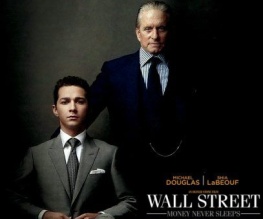Wall Street: Money Never Sleeps

Wall Street is one of the very few films which can genuinely be said to have had a visible impact on the shape of the modern world. Ever since its 1987 release, director Oliver Stone and star Michael Douglas have reported encounters with fans who confessed that their career choices were based on the example set by spectacularly ruthless corporate raider Gordon Gekko, and in the wake of the 2008 financial meltdown the finger has been repeatedly pointed at Stone’s indulgent portrait of success and excess as a contributory factor to modern traders’ devil-may-care recklessness. Whether or not it was truly relevant, Wall Street is for many people the definitive financial thriller; its long-awaited sequel Wall Street: Money Never Sleeps was always going to have a lot to live up to.
[FLOWPLAYER=http://uk.image-1.filmtrailer.com/30550.jpg|http://uk.clip-1.filmtrailer.com/3975_14330_a_5.flv,275,180]
It’s October 2001, and former prince of Wall Street Gordon Gekko (Douglas) is released from prison after serving eight years for insider dealing and securities fraud. Fastforward seven years and he’s eking out a living on the lecture circuit, questioning “Is Greed Good?” with a new book and mourning his non-existent relationship with adult daughter Winnie (Mulligan). Said daughter, whose character can be defined in every particular by the adjectives ‘liberal’, ‘pixie-haired’ and ‘weepy’, is somehow ignoring her towering daddy-was-an-evil-financier resentment just enough to be sleeping with dynamic young trader Jacob (LaBeouf), who has never met his prospective father in law.
When Jacob’s company collapses and his mentor (Frank Langella) steps in front of a train, Jacob seeks out the reformed Gekko to offer him a trade – access to his daughter in return for help finding out who wrecked Jacob’s career and wrote off his pseudo-daddy. It becomes apparent that shady banker Bretton James (Josh Brolin) scooped up quite a lot of dough when Jacob’s firm failed, and once we realise he was behind Gordon’s hefty jail sentence the film suddenly has a shiny new antagonist. Against the backdrop of the global financial meltdown, a series of intertwined dramas play out across the city – Gordon tries to save the world from the apocalypse on the horizon, Jacob struggles to save both his relationship and his pet investment project (cold fusion, natch) and Winnie just wants a big jumper and a Cup-a-Soup. And James? When Jacob asks how much it would take him to get out of the market, he simply replies “More.”

There’s a lot about Wall Street: Money Never Sleeps that’s very inventive and a lot of fun to watch. Visually, it’s a treat – the swirling graphics of modern trading software are ingeniously used to clothe the city in light and numbers which are pointedly illusory, and the sweeping shots of NYC skyline are as emotive as ever they were (although when you think of the original Wall Street‘s establishing shots the absence of the Twin Towers becomes grotesquely in-your-face). Unfortunately, very little else is new or innovative. The film is based on real-life events, which has hamstrung writers Allan Loeb and Stephen Schiff to a large extent – the sub-prime mortgage crash was very unfortunate, but in terms of a dizzyingly exciting drama it doesn’t really deliver.

This presumably explains the emphasis on family and fractured relationships as opposed to the plot-driven motif of the first film, but we didn’t come to see Gordon Gekko as a reformed character and wannabe doting father – antihero is all very well, but making him anti-interesting was a crime. Having said that, Douglas’ performance was a worthy follow-on from his last outing as Gordon – he’s older, wiser and less brash, but still possessed of the fiery streak which made him the greatest of his kind. It’s just a shame he has so little to do. The same goes for Carey Mulligan, a superb actress who was patronised to within an inch of her life by her boring, pathetic “Ooh, I’m a pinko journalist with delicate sensibilities and a low tolerance for bullshit!” part. And Shia? Oh, Shia. Why did you ever think a suit would be your look? Get back to running after Harrison Ford or (preferably) doing battle with stupid robots. It suited you, you and your bland little face and your pointless flashes of braggadocio.
Wall Street: Money Never Sleeps is enjoyable to watch (until the final fifteen minutes – trust me, just walk out). If I’d never seen the original, I’m sure I would have enjoyed it even more, but the unbridled euphoria of watching a film as utterly bloody brilliant as Wall Street just hammers home how much better this one could have been.




Recent Comments